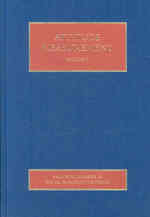- ホーム
- > 洋書
- > 英文書
- > Nature / Ecology
Full Description
Although veterinary professionals can now provide technologically sophisticated medical care for animals, every day they ask themselves questions that lie outside the realm of science. How do I overcome my dread of this hostile client? How can I protect myself from moral stress? What level of intervention is ethically appropriate for this patient? What does professionalism mean for me? While the work can be immensely rewarding, the veterinary sector can be very challenging. It is a world where clinical care is influenced and professionalism affected by multiple factors relating to colleagues, patients, animal caregivers and wider societal contexts. We deal every day with human problems that science alone can't solve.
This book offers new ways to think about these issues through the emerging interdisciplinary field of veterinary humanities. It breaks new ground in bringing together insights from multiple academic perspectives - history, art, ethics, social sciences and many more - to think about veterinary topics in a new way through contributions from over forty authors. Some are veterinary professionals with expertise in humanities and social science, others explore the veterinary world from a primary background in the humanities and social sciences. Addressing topics from across the veterinary sector, their writing ranges from deeply personal reflections to academic essays.
● 32 chapters by different authors with veterinary and/or humanities expertise
● Linking sections that relate these contributions to overarching themes
● UK-based scholarship with wider relevance
● Structured to stimulate reflection and discussion, in university, in the workplace, or anywhere where people consider what it means to be involved in the veterinary world.
This anthology will be particularly relevant to those training or working in the veterinary sector, whatever your role or level of experience. Other readers who are interested in animal welfare and human-animal relationships will also find it accessible, because the book assumes no clinical knowledge and offers no clinical guidance. It's a book about being human and working with animals, intended to help you think about what that means for you.
Contents
Part I: Care 1. From Medical to Veterinary Humanities, Theme 1: Perceiving Animals and Ourselves, 2. Shame, Motivation, Medicine and Me, 3. Veterinary Sensing Practices and the Crafting of Cow Bodies in Farming, 4. The Blueprint for Success, 5. Fresh Perspectives: What Can Vets Learn from Engaging with Art?, 6. Changing Faces, Theme 2: Care Practices and Treatment Choices, 7. The Human-Horse Relationship: Entanglements with Veterinary Care, 8. Contextualised Care in Exotic Animal Practice, 9. Six Strategies for Trust Building in Veterinary Care, 10. Contextualised Care and the Veterinary Nurse, 11. Veterinary Clinical Reasoning Through the Lens of Situativity Theory, 12. Welfare in the Balance: Ensuring Standards of Care in Shelter Medicine, Theme 3: End of Life, 13. From Veterinary Science to the Social Sciences: Rediscovering Veterinary End-of-Life Care, 14. Ethical and Legal Considerations When Making Decisions for Companion Animals at the End of Life, and 15. Understanding Client Bereavement at the End of Animal Life.
Part II: Professionalism Theme 4: Developing Professional Identity, 16. Locating the Humanities in Veterinary Education, 17. Developing a Professional Identity, 18. Reflective Capacity in Veterinary Professionals, 19. Using the Humanities in Veterinary Education: Developing Professionals, Theme 5: Evolving Professional Roles, 20. Care and Professionalism: How Are They Related and Why Is This an Issue?, 21. Care, Display, and Salvation: Biopower and the Zoo Veterinarian, 22. Vets as Authority Figures, Knowledge Brokers, Coaches and Mentors: The Changing Role of Vets in Addressing Endemic Conditions in Cattle and Sheep, Theme 6: Professional Communities and Relationships, 23. Professional Journeys into the Social Science of Veterinary Medicine: The Case of Animal Research, 24. One Health in Action: Feline Spongiform Encephalopathy and the BSE Epidemic, 25. An Exploration of the Importance of Interprofessional Collaboration Within Veterinary Practice and the Subsequent Need for Interprofessional Education, 26. Developing the Role of Animal Companionship Practitioner, 27. Vet-Client Relationships in Large Animal Practice: The Importance of Trust and Matched Expectations, Section 7: Professional Difficulties and Conflicts, 28. Moral Injury and Veterinary Nursing, 29. Queering the Veterinary Humanities, 30. Old Conflict, Long Shadows: Veterinary Attitudes to Dog Breeding Through the Lens of History, 31. The Autistic Retrospectoscope, and 32. Virtue Ethics in Veterinary Medicine.







